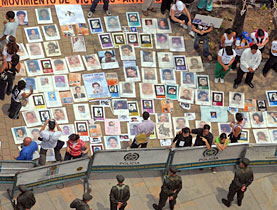Clouds hang over Calmy-Rey’s visit to Colombia

Switzerland should continue to offer its services and know-how in Colombia despite apparent tensions, Thomas Fischer, a Swiss expert on Latin America, tells swissinfo.
Foreign Minister Micheline Calmy–Rey is due to hold talks in Bogotà this week. Bilateral ties are tarnished over Switzerland’s role in mediation efforts with the leftwing Revolutionary Armed Forces of Colombia (Farc).
The official aim of the three-day visit is to boost bilateral relations, launched 100 years ago.
But the Colombian government has accused a Swiss mediator, Jean-Pierre Gontard, of transporting ransom money for the rebels.
Fischer, a professor of history at the university of Eichstätt-Ingolstadt in Germany, says Swiss interests in Colombia have always been driven primarily by trade interests.
He also highlights Switzerland’s role as a mediator in the conflict in the region and in border tensions in the 1920s. Colombia for its part considers Switzerland as a friendly nation, although not a strategic partner.
swissinfo: What impact do the allegations against the Swiss mediator have on the visit by Calmy-Rey to Colombia?
Thomas Fischer: The visit has been carefully planned between the two sides. Neither of them will try to compromise the other.
But relations will only normalise once Colombia either produces evidence against Gontard or investigations are closed.
It is not clear to me whether the Colombian government was fully aware of the consequences when it withdrew the mandate of international mediators and accused Gontard of being an accomplice of the Farc rebels.
swissinfo: Why is Bogotà still focusing its attacks on Gontard after the suspension of all international mediation?
T.F.: It is no secret that the government of Álvaro Uribe never favoured a negotiated solution with the rebels and the involvement of non-governmental organisations.
But nor could the rebels show convincingly that they are seriously interested in a peace deal.
In such a climate of antagonism it is very difficult for anybody, particularly when they come from outside. The Swiss mediator is a victim of the situation and it is typical that he has been labelled as ‘useful idiot’.
swissinfo: Is it realistic for Switzerland to keep up its offer to help as a mediator in Colombia?
T.F.: Switzerland should continue to offer its good services in talks between the government and rebels.
It should also continue its humanitarian role and provide legal assistance and know-how in efforts to deal with Colombia’s violent past and compensation of the thousands of displaced people.
Switzerland’s role is limited, because it is difficult to convince the wider public at home about missions outside Europe.
Ultimately it’s all up to Uribe and the Colombian population whether they will allow Swiss help.
swissinfo: How plausible are the allegations by the Colombian government that the Farc rebels receive support from groups in Switzerland and other countries in Europe?
T.F.: It is not unlikely that Farc representatives live in Europe, including Switzerland, and that there are a handful of self-righteous Farc sympathisers here, as well as in other parts of the world.
But the material and ideological support from Europe is not decisive for the rebels. The Colombian conflict has domestic reasons.
But it is there is no denying that part of the money for the rebels comes from the drugs trade, also in Europe.
swissinfo: The Red Cross emblem was misused in the liberation of Ingrid Betancourt and other hostages from the hands of the Farc rebels. How far will the Colombian government go?
T.F.: It’s the declared goal of Uribe’s government to destroy the rebels and the end justifies the means for the authorities.
It appears Uribe does not care about the damage done to the Swiss-run International Committee of the Red Cross (ICRC) by the improper use of its emblem during the liberation of 15 out of hundreds of hostages.
Nor does the government seem to be concerned about a loss in its own credibility on an international level.
Colombian governments have traditionally given little attention to human rights. But the rebels who take hostages and use child soldiers are no better.
swissinfo-interview: Geraldo Hoffmann
The visit by Foreign Minister Calmy-Rey to Colombia, due to begin on Monday, is aimed at fostering bilateral relations launched 100 years ago.
She is to meet her Colombian counterpart as well as President Uribe to discuss tensions between the two countries over Swiss involvement in negotiations with the leftwing Farc rebels.
The foreign minister will also visit projects on humanitarian aid and civilian peace building, as well as meet representatives of Swiss firms and other Swiss expatriates in the region.
Afterwards Calmy-Rey will travel to Brazil – Switzerland’s most important trading partner in Latin America – to promote political consultations on a regular basis and to boost cooperation in various areas.
The Swiss government spent about SFr7.5 million ($7.1 million) on development, aid and economic cooperation with Colombia last year.
The humanitarian aid unit of the Swiss Agency for Development and Cooperation (SDC) has been active in Colombia since 2001. Its aid budget is around SFr4 million ($3.8 million).
Since 2002, Switzerland has worked towards facilitating a mechanism for dialogue between the leftwing Farc rebels and the Colombian government, alongside France and Spain, to achieve a humanitarian agreement aimed at freeing hostages.
Switzerland, as well as Norway and Spain, has also taken part in peace talks between the Colombian government and the country’s other main guerrilla force, the National Liberation Army.

In compliance with the JTI standards
More: SWI swissinfo.ch certified by the Journalism Trust Initiative
You can find an overview of ongoing debates with our journalists here. Please join us!
If you want to start a conversation about a topic raised in this article or want to report factual errors, email us at english@swissinfo.ch.